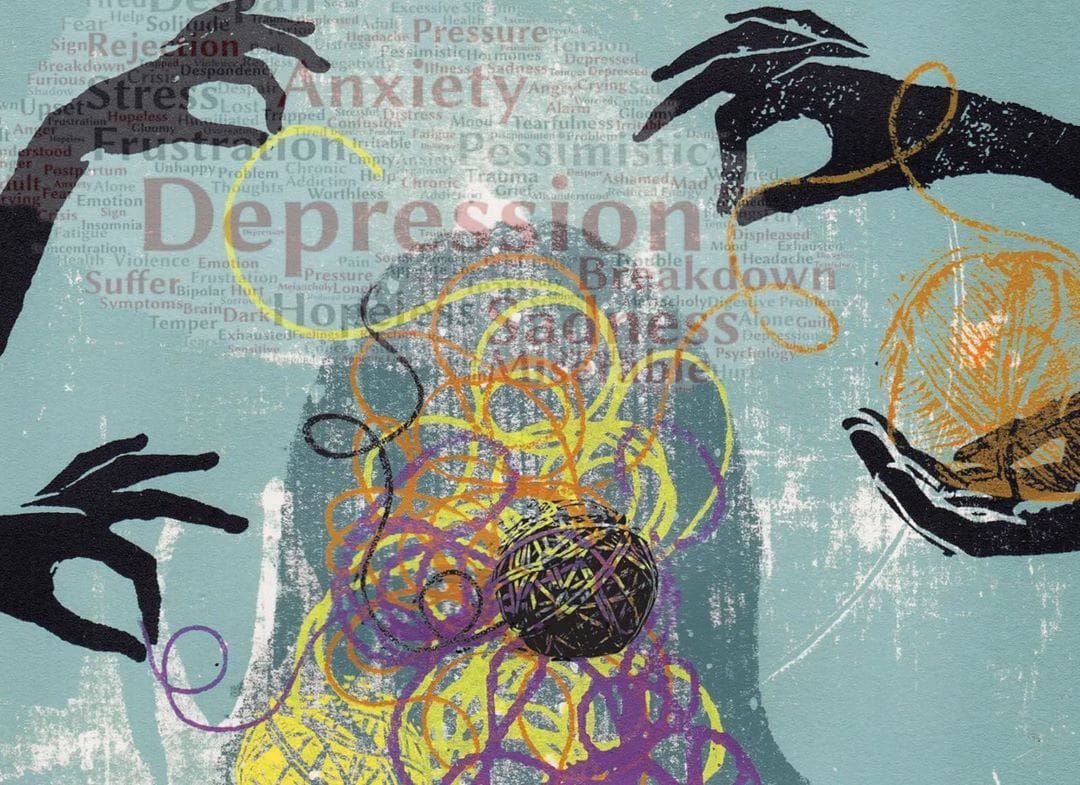Mental depression, often referred to as major depressive disorder, is a prevalent mental health condition affecting millions of individuals worldwide. Unlike fleeting feelings of sadness or the blues, depression is a persistent condition that can interfere with daily life, relationships, and physical health.
This guide explores the various aspects of depression, including its meaning, symptoms, causes, diagnosis, prognosis, treatment, counseling, and the role of support groups. By answering common FAQs and providing data on affected age groups, this blog aims to offer a thorough understanding of depression and how to address it.

What is Mental Depression?
Mental depression is a serious mood disorder characterized by prolonged periods of sadness, hopelessness, and a lack of interest or pleasure in activities once enjoyed. It’s a medical condition that affects how individuals feel, think, and behave, often leading to physical and emotional problems. In severe cases, it can impair a person’s ability to perform daily tasks and enjoy life.
Depression is different from occasional sadness; it is a chronic condition that requires attention and intervention.
Symptoms of Depression
Depression symptoms vary from person to person but generally include:
- Emotional Symptoms:
- Persistent sadness or emptiness.
- Loss of interest or pleasure in activities (anhedonia).
- Feelings of worthlessness or excessive guilt.
- Cognitive Symptoms:
- Difficulty concentrating or making decisions.
- Recurrent thoughts of death or suicide.
- Physical Symptoms:
- Fatigue and lack of energy.
- Sleep disturbances (insomnia or hypersomnia).
- Changes in appetite or weight (increase or decrease).
- Physical complaints like headaches, back pain, or digestive problems without a clear cause.
What Causes Depression?
Depression doesn’t have a single cause but results from a combination of factors:
- Biological Causes:
- Imbalances in brain chemicals like serotonin, dopamine, and norepinephrine.
- Hormonal changes, such as during pregnancy or menopause.
- Genetic Factors:
- A family history of depression increases susceptibility.
- Environmental Triggers:
- Traumatic events, such as abuse, loss of a loved one, or financial instability.
- Lifestyle Influences:
- Poor diet, lack of physical activity, or substance abuse can exacerbate depressive symptoms.
- Medical Conditions:
- Chronic illnesses like diabetes, heart disease, or thyroid imbalances.
How is Depression Diagnosed?
Diagnosing depression involves a multi-step approach:
- Self-Assessment and Reporting:
- A healthcare provider may ask about mood changes, sleep patterns, and energy levels.
- Physical Examination:
- Tests are conducted to rule out medical conditions like hypothyroidism or vitamin deficiencies.
- Psychological Evaluation:
- Tools like the PHQ-9 (Patient Health Questionnaire) assess the severity of depressive symptoms.
Prognosis of Depression
With timely and effective treatment, many individuals recover from depression and regain control of their lives. However, untreated depression can lead to chronic episodes or complications, including increased risk of substance abuse, self-harm, and suicide. A strong support system and adherence to treatment plans significantly improve outcomes.
Treatment for Depression
- Medication:
- Antidepressants: Medications like SSRIs (e.g., Prozac, Zoloft) and SNRIs are commonly prescribed to balance brain chemicals.
- Side Effects: May include nausea, weight changes, or sleep disturbances, though these often diminish over time.
- Psychotherapy:
- Cognitive Behavioral Therapy (CBT): Helps identify and modify negative thought patterns.
- Interpersonal Therapy (IPT): Focuses on improving personal relationships and communication skills.
- Lifestyle Adjustments:
- Regular physical activity, a balanced diet, and maintaining a sleep schedule can alleviate symptoms.
- Stress management through techniques like yoga, mindfulness, or journaling.
- Natural Remedies and Supplements:
- Omega-3 fatty acids and St. John’s Wort (under medical supervision) are sometimes considered.
Counseling and Support Groups
Counseling offers a non-judgmental environment for individuals to express their feelings and explore coping strategies. Support groups connect people who share similar experiences, offering emotional support and reducing feelings of isolation.
Organizations like the National Alliance on Mental Illness (NAMI) and Depression and Bipolar Support Alliance (DBSA) provide resources, both in-person and online.
Depression and Demographics
Depression can affect anyone, but certain age groups and demographics are more susceptible. Below is a demographic table highlighting the prevalence of depression across various age groups:
| Age Group | Prevalence (%) | Key Factors |
| Adolescents (13–17) | 13% | Hormonal changes, academic pressure, social media. |
| Young Adults (18–25) | 17% | Stress from career, relationships, and financial independence. |
| Adults (26–45) | 12% | Work-life balance, family responsibilities. |
| Seniors (65+) | 6% | Loneliness, chronic illnesses, and bereavement. |
Common FAQs About Depression
- What are the symptoms of depression?
Symptoms include sadness, fatigue, changes in appetite, and sleep disturbances. - What causes depression?
It results from biological, genetic, environmental, and lifestyle factors. - How is depression diagnosed?
Through self-assessment, physical exams, and psychological evaluations. - What are the treatment options for depression?
Treatment includes medication, therapy, lifestyle changes, and support groups. - Can depression be cured?
While not always curable, it can be effectively managed with treatment. - What is the difference between depression and anxiety?
Depression involves persistent sadness, while anxiety focuses on excessive worry. - How can I help someone who is depressed?
Be supportive, encourage professional help, and remain patient. - Are there natural remedies for depression?
Omega-3 supplements and mindfulness can help but require medical supervision. - What are the side effects of antidepressants?
Side effects vary but may include nausea and weight changes. - How does depression affect daily life?
It disrupts work, relationships, and overall well-being.
Conclusion
Mental depression is a significant but treatable condition. Individuals can take proactive steps toward recovery by understanding its symptoms, causes, and treatment options. Remember, help is available, and no one has to face depression alone.
If you or someone you know is struggling with depression, reach out to a healthcare professional or a trusted support organization. Together, we can reduce mental health stigma and promote a brighter, healthier future for all.
Share this blog to spread awareness and help others understand and combat mental depression.
For more Health Related Blogs, Read our Trending Blogs: 10 Urgent Diabetes Symptoms, Teenage Depression, Victory Over Cancer.
Enjoyed this article?
If you find the blogs helpful, you can support Chatterlane with a small contribution. Even a cup of coffee helps me continue creating useful, well-researched content.


Comments
3 responses to “Depression Symptoms, Causes and Treatments: A Complete Guide”
nice post
[…] They should change their medicine as their doctor tells them to.Related Reads You Might Enjoy:Depression Symptoms, Causes and Treatments:Victory Over Cancer: Are We Close to Winning?Diabetes: It’s Types, Causes, Symptoms, and Effective […]
I am really impressed with your writing talents as neatly as with the structure for your weblog. Is that this a paid topic or did you customize it your self? Either way keep up the excellent quality writing, it is rare to peer a great weblog like this one today. !